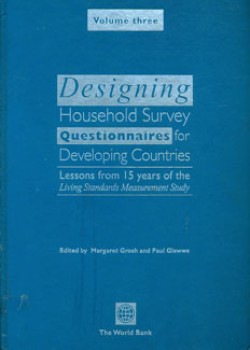
Designing Household Survey Questionnaires for Developing Countries
Lessons from 15 Years of the Living Standards Measurement Study - Volume 3
Editor: Grosh, Margaret and Glewwe, Paul.
Publisher: The World Bank (WB)
Place of Publish: USA, Washington D.C.
Year: 2000
Page Numbers: 500
Acc. No: 1630
Class No: 001.42 DES
Category: Books & Reports
Subjects: Health
Type of Resource: Monograph
Languages: English
ISBN: 0-19-521595-8
Governments need accurate, current, and relevant data from household surveys to make sound economic and policy decisions. Analysts need the data to model economic behaviour, which can provide answers to important policy questions. For many countries, however, these data are incomplete, unreliable or out of date. This handbook was developed to remedy this situation. It is a comprehensive treatise on the design of multi-topic household surveys in developing countries. It draws on 15 years of experience from the World Bank,s Living Standards Measurement Study (LSMS) surveys and other household surveys conducted in developing countries. The handbook covers key topics in the design of household surveys, with many suggestions for customizing surveys to local circumstances and improving data quality. Detailed draft questionnaires are provided in written and electronic format to help users customize their surveys. Designing Household Survey Questionnaires for Developing Countries serves several audiences: survey planners from national statistical and planning agencies, universities, think tanks, consulting firms and international organizations; those working on either multi-topic or topic-specific surveys; data users, who will benefit from understanding the challenges, choices, and trade-offs in data collection. The objective of this book is to provide detailed advice on how to design multi-topic household surveys, based on the experience of past household surveys. This book will help individuals and organizations that are planning a comprehensive, multi-topic survey to define the objectives of their survey, identify the data needed to analyse those objectives and draft questionnaires that will collect such data.



